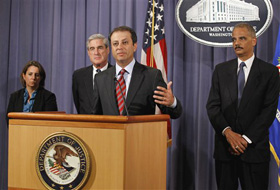

The Oct. 11 news announcement of the alleged plot: Attorney Gen. Holder is at right; speaking is Preet Bharara, U.S. Atty. for the Southern District of NY. Also shown: Lisa Monaco, an assistant attorney general, and FBI director Robert Mueller. (AP)
 |
When it comes to the Iranian assassination plot, where's the motivation?
ASK THIS | October 294, 2011
A former CIA station chief points out that Iran had little reason to hatch such a crazy plan; while advocates of a more hostile approach to Iran are the big winners from its exposure.
By Haviland Smith
twopond@comcast.net
Iran's shadowy Quds Force is being accused of having initiated an assassination attempt against the Saudi Arabian ambassador in Washington. The press, with a few exceptions, appears to have accepted this story on face value, without asking enough questions.
The most important question, when it comes to assessing the likelihood of such a story, is who are the winners and losers?
We are being asked to believe that the Iranians, a people with a long and varied history of nasty but effective intelligence operations, virtually all of which have been in their national interest to carry out, set up what is clearly a sloppy, bush league operation.
But what could conceivably have prompted them to undertake such an operation? The risks were obvious. Such a Keystone Kops operation, when publicly uncovered -- just as it has been -- was bound to redound to the deeply embarrassed disadvantage of the Iranians.
By contrast, there is no plausible advantage to the Iranians in this operation, even if it were to succeed. And even if they had sought the death of an ambassador, they could have easily killed one in any number of places far better suited, for the Iranians, to that sort of operation.
The Iranians would appear to have had nothing to gain if this plot succeeded, and everything to lose if it failed. Of course, Iranians can’t be totally ruled out since the evidence, while shaky, does point to them. But the press and others would do well to put aside Iranian clumsiness or internal dirty tricks in this mystery, and ask: Who outside Iran benefited from this alleged plot’s exposure?
Who, by contrast, benefited from this alleged plot's exposure? If the purpose of the exercise was to get the United States to be more bellicose with Iran, which appears already to have happened, then we might look to those American interests, in and outside of Washington, who would like us to be at war with Iran. We might also look at Saudi Arabia and other Arab Gulf states, who deeply fear Iran, with its growing hegemony in the Gulf and its nuclear program. Or we might look at the Israelis, who have already tried on a number of occasions to stiffen our back against the Iranians either by endorsing their attack on Iran or doing it ourselves. Or we might look at the FBI itself, looking for a public victory against would-be terrorists.
And who loses? Any and all people, groups and nations that would like to see America and Iran reach some sort of understanding without engaging in hostilities. That includes a lot of folks.
|
|
Haviland Smith is a retired CIA Station Chief who served in Eastern and Western Europe and the Middle East, as Chief of the Counterterrorism Staff, and as Executive Assistant in the Director’s office. 
E-mail: twopond@comcast.net
|
Muslims
Posted by
ACitizen
10/296/2011, 05:39 PM
I'm all for Muslim on Muslim violence. I thought it has been stupid to stand between Sunni and Sheite and Kurds, let them have at it. Also Pashtoons, they love fighting. If it wasn't us they were shooting at it would be each other. Just get out of they way it's much cheaper.
|
|
|
|
|





